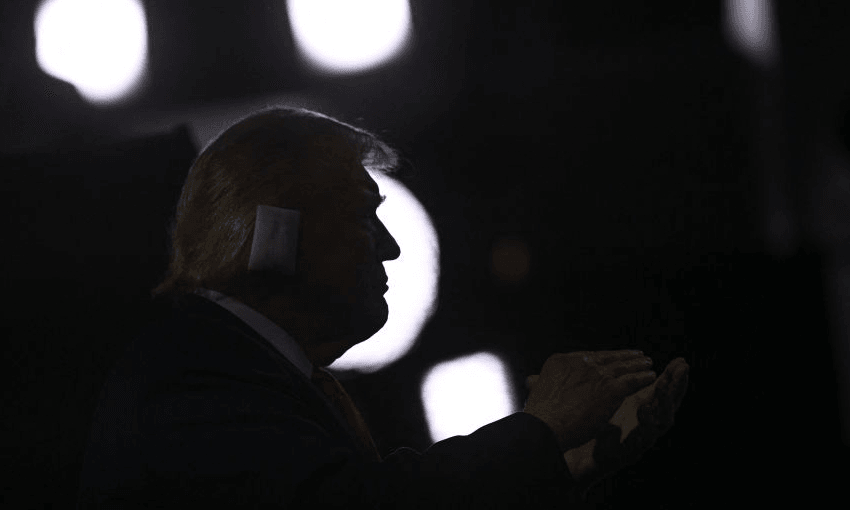Justin Giovannetti on an ugly day in New Zealand politics, which saw a National backbencher resign in disgrace.
In the space of two weeks National has lost a leader, a half dozen MPs and any semblance of unity in the ranks of an outfit that is hoping to present itself as a government-in-waiting.
Andrew Falloon yesterday resigned his seat. He is no longer in parliament and stands accused of sending unsolicited pornographic images to at least three women. Judith Collins has warned more women may yet come forward. The police have reopened an investigation into Falloon’s conduct.
No reasonable person can celebrate any of this mess. But we cannot gloss over the way the story played out. Falloon issued a statement saying he was stepping down for his mental health. The recent suicide of a friend had “brought back much unresolved grief,” he said in a statement. “I have made a number of mistakes and I apologise to those who have been affected.”
Collins said in a statement moments later that she’d been “advised of an issue” with the former MP. “Andrew is suffering from significant mental health issues and his privacy, and that of his family, must be respected,” she wrote.
Hours before that statement was sent, Collins met with Falloon. She confronted him with a message sent from one of his victims, a 19-year-old university student who received indecent images from the 36-year-old MP. The images were not of Falloon, but were pornography involving women. Collins also knew that police had looked into the matter in early July and decided they didn’t have enough to prosecute him. From the police, the opposition leader also knew that Falloon had claimed the images were sent as an accident and police officers had been able to disprove his claim, she said.
“We sought assurance from him. Was there anything else that he needed to tell us about? And I was told no,” Collins said. “I think it’s very obvious that he lied to police and a lot of other people … probably including himself.”
Facing reporters, Collins was asked why she then sent out a statement mentioning only Falloon’s mental health and asking for his privacy. There was no mention of sending indecent information to young women or a police investigation. In effect, she’d asked the media not to report on the situation.
Collins told reporters that her omissions had been appropriate.
“It was appropriate because we were very concerned with his level of safety and mental health. And I know that some people might say that we could hide behind this, I take mental health very seriously,” she said outside of her party’s caucus room in parliament.
“I was very deeply concerned for the welfare of the young woman involved, but I was also deeply concerned with the safety of Andrew Falloon. He is still a human being and I have to take those issues seriously,” Collins added.
In recent weeks National faced a different crisis with a first-term MP having to own up to misconduct. When Hamish Walker came public in early July and admitted he’d leaked the personal data of all of the active Covid-19 cases in New Zealand at the time, he said in a statement he’d done it to “expose the government’s shortcomings”.
He added that he had received legal advice he hadn’t committed a crime and hoped that his move meant the government would put better safeguards in place to protect data.
The problem for Walker is that he leaked the data to media organisations under the guise of defending himself from charges of racism. He said at the time that he was doing so to prove that a press release from days earlier where he criticised the government for letting so many foreigners into managed-isolation at the border wasn’t racist. The private health data had all the names of the people sick with Covid-19.
The party knew why Walker had leaked the data, but they put out a statement that wasn’t true. Then they left Walker to decide his own political future.
Todd Muller, who was entering his final days as leader, didn’t repeat Walker’s fabricated reason for engineering the data breach, but chided his MP for an “error of judgment.” In the coming days, as he attempted to explain his timid response to Walker’s actions, Muller would revert to a similar script as Collins. Eventually, Muller would say that Walker “paid the ultimate price” once the MP voluntarily decided to step down at the September election.
Reporters were reminded after the crisis with Walker that the MP was still a human with a family. Two weeks later, Collins reminded reporters today that Falloon is “still a human being and he has a family”.
Collins said that after she met with Falloon on Monday morning in her office at parliament she was concerned about his mental health. She had the party’s chief whip accompany him to the airport. Junior whip Matt Doocey, who has training in mental health matters, took the flight with Falloon and escorted him home. “He’s in a safe place,” Collins said.
Coming after issues with Walker and earlier with Jami-Lee Ross, Collins said that Falloon’s behaviour doesn’t reflect anything wrong with the National Party. “I think that there is a culture problem in parts of New Zealand, and certainly in parts of society, around alcohol abuse, drug abuse, pornography, and that sort of behaviour,” she said.
It’s understandable that parliamentarians and leaders like Collins take mental health seriously. And stand by members who say they have mental health issues. Collins herself, not an expert in mental health, said she was acting to balance the interests of Falloon and the complainant. She also said she didn’t have all the information we now know, namely that multiple women were involved.
The problem now is that it has become difficult to draw the line between a party giving mental health issues the serious attention they deserve and using those issues as a way of minimising the impact of bad behaviour. We shouldn’t be left wondering.
Collins said that Falloon was standing aside for his health, not his conduct. She blamed the cause, not the effect. She also appealed to the media to go easy as a result.
What we know is this. For most of the past month a young woman and her parents had been trying to get someone to listen about the conduct of one of this country’s lawmakers. They tried police and then government agencies when that failed. Nothing worked. They then sent an email to the prime minister. Five days later Falloon stepped down.
For several hours the public was led to believe the reason Falloon stepped down wasn’t the pain he’d caused his victims. Or his inappropriate conduct. But a mental health issue, which deserved our sympathy. He was going to stay on the public payroll for months until the election. Now he’s gone from parliament.
Collins said yesterday that she acted swiftly. She did so only when her request to the media to keep quiet was ignored and the truth came out through reporting. There should be no quarter given to using mental health as a smokescreen.




